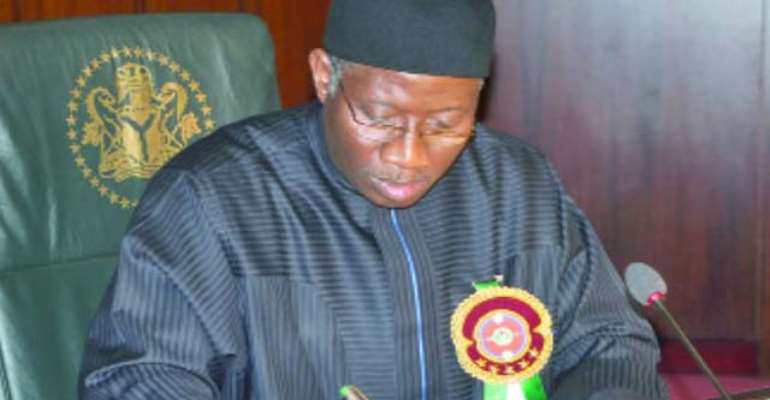Jonathan now to present 2014 budget on November 19

President Goodluck Jonathan's budget speech will no longer take place Tuesday (today) as earlier scheduled.
The budget will now be presented to the law makers on November 19.
Chairman, Senate Committee on Information and Media, Enyinnaya Abaribe, said in a phone interview with Bloomberg news agency on Monday that the budget announcement had been postponed because parliament had not yet approved the spending plan upon which it will be based.
Another reason offered by the spokesman was that and some lawmakers were attending a conference away from the legislature..
Investors are watching Jonathan's budget for signs that spending will soar in a pre-election year as it did before the 2011 presidential vote, when it climbed 17 percent. Jonathan, 55, signaled his intent to cut planned expenditure by 10 percent next year to 4.5 trillion naira ($28 billion) as crude output missed targets, according to a medium-term spending plan released on Sept. 18.
'The one the government will present will be a relatively tight, well thought-out budget, but when the electoral process really ramps up in the second half of next year, there could be supplementary budgets for political spending', David Cowan, Africa economist at Citigroup Inc. in London, said in a phone interview. 'That's key to understanding the fiscal process'.
Jonathan, who has not yet said whether he plans to stand for re-election, was voted into office in 2011 on a platform of boosting economic growth by improving the country's electricity-generating and oil-refining capacity.
Lower oil revenue and the risk of overspending is putting pressure on the currency, which the central bank aims to keep stable within a range of 3 percent around 155 against the dollar. The naira has dropped 1.6 percent versus the U.S. currency this year to trade at 159 on the interbank market as of 4 p.m. in Lagos.
Finance Minister Ngozi Okonjo-Iweala, has pushed to curb spending on government salaries to keep the budget deficit under control. The medium-term plan estimates a fiscal shortfall of 1.9 percent of gross domestic product in 2014, little changed from 1.85 percent projected for this year. The median estimate of seven economists surveyed by Bloomberg is for the deficit to widen to 2.3 percent next year from 2.2 percent.
If the numbers in the spending plan are accurate, 'it's looking like a very tight budget,' Charles Robertson, global chief economist at Renaissance Capital in London, said in a phone interview. 'It's conservative on spending, it's conservative on the deficit. It's a budget to win the trust of investors ahead of the election in 2015.'
Okonjo-Iweala said on Oct. 31 that theft of crude as well as output interruptions in the country's Niger River delta oil heartland may result this year in the government's proceeds from oil falling as much as $12 billion below budget estimates.
Africa's most populous country, home to more people than France and Germany combined, relies on crude exports for about 80 percent of government revenue and 95 percent of foreign-currency earnings.
The government has run down its oil savings in the Excess Crude Account to plug the revenue shortfall. The account had a balance of just under $5 billion, down from about $9 billion at the beginning of the year, Okonjo-Iweala said last month.
'The great challenge now is that the fiscal buffers are not as strong as they would be because of the revenue shortfall,' Central Bank of Nigeria Governor Lamido Sanusi said in an interview on Nov. 1. 'If there are any adverse external developments that would feed into this weak revenue profile and put pressure on exchange rates.'
The ruling People's Democratic Party, or PDP, which has won all elections held since Nigeria ended military rule in 1999, faces its sternest challenge as the 2015 vote approaches. The nation's four main opposition parties merged this year in order to take on Jonathan, while some senior PDP figures quit the party to form their own group.
Nigeria is still well-placed relative to its emerging-market African peers if the budget deficit deteriorates, according to Cowan.
'Even if the budget slips next year, say from a deficit of 2.2-2.5 percent of GDP to 3.5 or 4 percent, this is still relatively slim compared with Ghana, Kenya and Zambia,' he said.
Ghana is forecasting a budget deficit of 9.2 percent of GDP this year, its Vice President Kwesi Amissah-Arthur said last month, while both Kenyan and Zambian budget deficits exceed 5 percent.
The medium-term spending plan projects oil output of 2.39 million barrels a day for 2014, compared with 2.53 million barrels this year. Actual production this year has fluctuated between 1.8 million and 2.2 million barrels a day, according to data compiled by Bloomberg.
'What we'd hope for is a more realistic projection for oil production,' Giulia Pellegrini, sub-Saharan Africa economist at JPMorgan in London, said in an interview. 'Clearly 2.5 million barrels a day is unrealistic. 2.3 million would be more realistic, but it depends on the government continuing efforts against oil theft, and actually realizing some victories on that score.'
